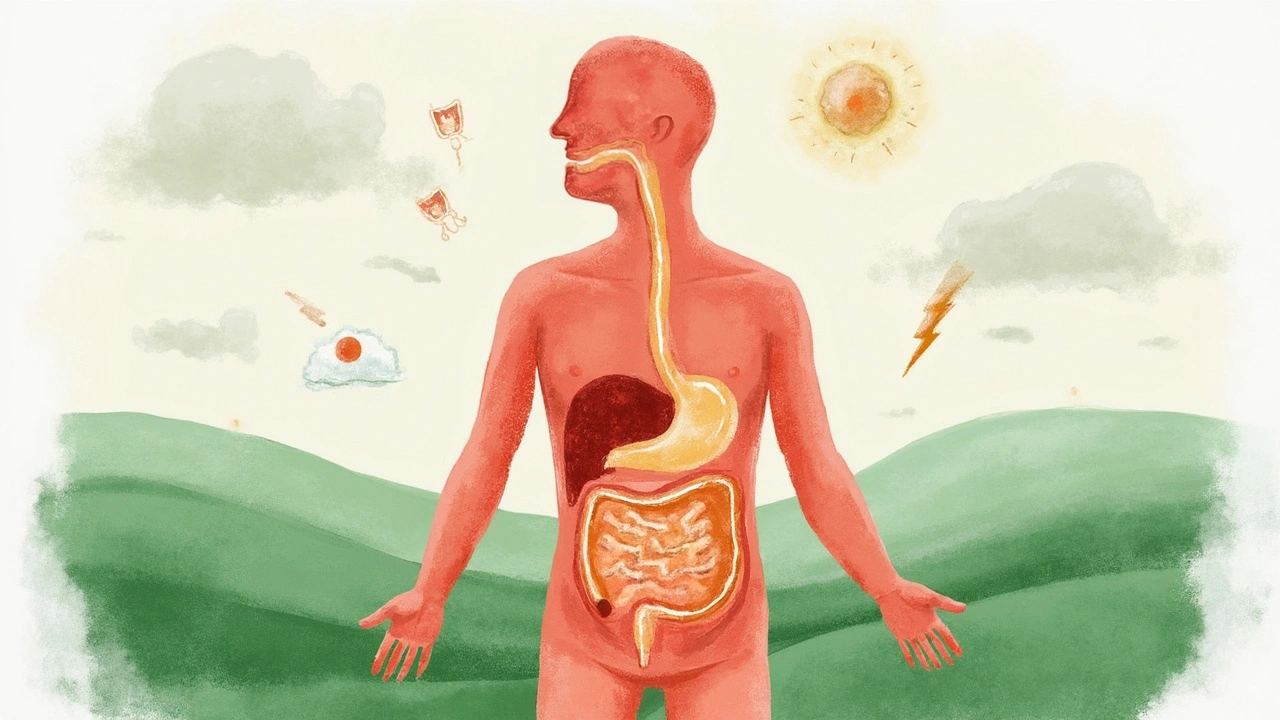Imagine waking up with steady energy, rarely feeling bloated, and keeping colds at bay all year. It sounds dreamy, but missing this last piece—the gut—could explain why other healthy habits fall short. Most people focus on eating well or exercising, then miss how gut health quietly shapes immune power, mood, weight, and even skin. Science now sees the gut less like a plumbing system and more like a command center. If you clicked here hoping for clearer answers on gut basics, symptoms to watch for, or the best daily changes, you’re in the right place.
- Gut health shapes your digestion, mindset, energy, skin, and immune system.
- It’s not just about food—stress and sleep matter too.
- Common symptoms of poor gut health include bloating, fatigue, and mood swings.
- Small steps—fiber, fermented foods, and lifestyle tweaks—make a real difference.
How Your Gut Impacts Your Whole Body
The gut—also called your digestive tract—hosts about 100 trillion microbes, mainly bacteria, making up your “microbiome.” That’s more cells than the whole rest of your body. What these trillions of tiny guests do (and don’t do) has a ripple effect on everything from the regularity of your bathroom trips to if you catch every cold or just breeze through winter. Shockingly, around 70% of the immune system lives in the gut, according to the American Gut Project. When your gut is balanced, it trains your immune troops, makes vitamins (like B12 and K), breaks down food into absorbable nutrients, and even sends signals to your brain.
Dysfunction isn’t rare. Recent studies in 2024 by the World Gastroenterology Organization show that over half of adults report some type of digestive complaint during any six-month period. Bad gut health has been tied to allergies, low mood, acne, irritable bowel syndrome, brain fog, and weight issues—not just tummy trouble.
| Health Issue | Gut Link |
|---|---|
| Low Mood/Anxiety | 95% of serotonin made in gut; poor gut linked to mood changes |
| Frequent Sickness | Gut trains 70% of the immune system |
| Fatigue/Brain Fog | Poor absorption of nutrients impacts energy |
| Skin Breakouts | Inflammatory signals from gut imbalance show on skin |
If age creeps up, the odds of gut issues rise. Those over 40, according to the Journal of Nutrition 2023, produce less stomach acid—making digestion harder and changing the gut’s makeup. But everyone, from teens to retirees, benefits from a better-functioning gut.
How to Tell If Your Gut Needs Help
No complicated testing needed—listen to your body. Here are red flags many ignore but shouldn’t:
- Digestive drama: Daily bloating, gas, constipation, diarrhea, or heartburn
- Fatigue: Tired after eating or feeling sluggish most days
- Mood shifts: Anxiety, low mood, irritability without an obvious reason
- Strange cravings: Always hungry or craving sugar, carbs, or processed food
- Skin flare-ups: Eczema, pimples, or unexplained rashes
- Sickness magnet: Getting sick way more than friends or family
None of these mean a crisis on their own, but if you check three or more, chances are your gut needs attention. Doctors like Dr. Emeran Mayer at UCLA suggest that gut imbalances often show up as a blend of these symptoms, not just stomach pain.
Building a Happier, Healthier Gut: Science-Backed Steps
Let’s get practical. You don’t need to go on a wild detox or spend hundreds on fancy supplements. These five habits reset and nurture your gut, based on what’s proven to work in 2025.
- Eat more plant fibers. Think beans, lentils, berries, oats, Brussels sprouts. Fiber is the favorite food of good gut bacteria. New UK research in 2025 finds just 5 more grams of fiber daily boosts gut diversity within 2 months.
- Add fermented foods. Yogurt (with live cultures), kefir, kimchi, sauerkraut, miso, and tempeh top up your intake of live “probiotic” bacteria.
- Don’t forget prebiotics. Some foods—like onions, garlic, bananas, asparagus, and leeks—feed good bacteria so they can thrive. A 2023 Harvard review suggests prebiotics may be even more important than probiotics for building a strong microbiome.
- Manage stress and sleep. If your mind is under pressure or you’re sleep-deprived, it messes with gut balance. Regular sleep and stress-reducing habits like walks, meditation, or breathing exercises work wonders.
- Switch up your meals. Variety means your gut gets exposed to more friendly bacteria and nutrients. Aim for 30 different plant foods each week. It’s easier than it sounds—count herbs, spices, grains, nuts and seeds too.
If you drink alcohol, do so rarely—heavy drinking disturbs good gut bugs. And unless your doctor says otherwise, antibiotics should be used only when needed, not "just in case"—they wipe out helpful bacteria along with the bad.
| Food Type | Gut Benefit | 2025 Example |
|---|---|---|
| Fiber-rich | Feeds good bacteria, supports regularity | Chia overnight oats |
| Fermented | Supplies probiotics, supports immunity | Korean kimchi, Greek yogurt with live cultures |
| Prebiotics | Feeds existing gut microbes | Roasted onions, garlic hummus |
| Polyphenols | Fights inflammation | Fresh berries, dark chocolate |

Checklist: Your 2025 Healthy Gut Rituals
- Add two plant-based foods you haven’t tried before this week.
- Swap sugary dessert for fruit and nuts twice a week.
- Buy one new fermented food this month; check for "live cultures" on the label.
- Sleep a minimum of 7 hours nightly whenever possible.
- Try deep breathing or walk outdoors once a day to manage stress.
Mini-FAQ: Gut Health Questions Everyone Asks
- How long does it take to notice improvement? Many people feel better in a week or two, but full gut reset takes 1–2 months.
- Are probiotic supplements necessary? Usually no—most folks get enough from a mixed, diverse diet with some fermented foods.
- Is gluten or dairy always bad for gut health? Not for everyone. If you don't have an intolerance or allergy, they can be part of a healthy diet, especially fermented dairy.
- Can children and teens improve gut health? Yes, good habits and variety matter for all ages. It can help with immune strength, energy, and even focus.
- Is coffee bad for the gut? Actually, moderate coffee has been shown to help some gut bacteria. But if it makes you jittery or worsens heartburn, cut back.
Next Steps: Gut Health for Every Lifestyle
If you work long hours: Prep fiber-packed snack boxes—like carrots, hummus, and mixed berries—to take with you.
For busy parents: Rotate new fruits, veggies, and whole-grain options into lunches. Yogurt with real fruit is a fuss-free fermented pick for kids.
Night owls or shift workers: Build a regular wind-down with herbal tea and lights-down 30 minutes before bed to reset gut-friendly sleep cycles.
For athletes: Add fermented foods like kefir smoothies post-workout to help recovery and reduce inflammation.
If you’re managing a chronic illness: Always check with your doctor before big changes, but most gut-boosting foods are safe for nearly everyone and often ease symptoms.
Gut health is not one-size-fits-all, but building back those good bacteria, prioritizing rest, and trying new plant-based flavors set you up for happier digestion, resilient mood, and fewer sick days. And honestly? A healthy gut just makes life feel easier.
